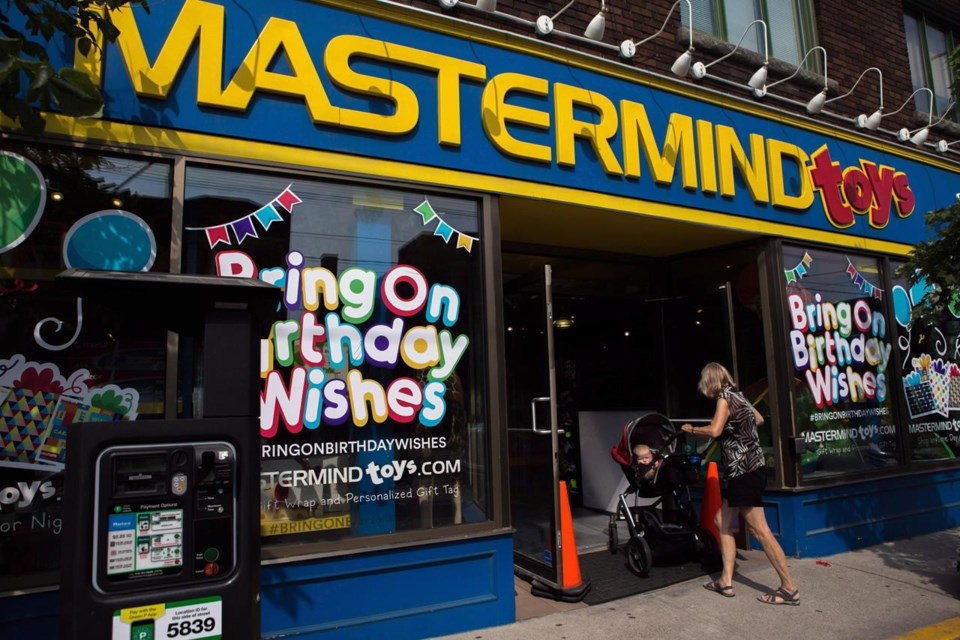TORONTO — Ailing toy retailer Mastermind GP Inc. says it has reached a deal to sell the bulk of its business to a company representing three big names in the Canadian retail world.
The Toronto-based chain announced Monday that it has signed an asset purchase agreement with Unity Acquisitions Inc., a company run by Joe Mimran, Frank Rocchetti and David Lui.
Mastermind and Unity did not disclose the financial terms of their deal, which is still subject to court approval but is expected to close in January.
The deal includes the majority of Mastermind Toys store locations and will allow a "significant" portion of the company's 800 employees to continue with the business.
"The acquisition aligns with Unity’s strategy to enhance and grow extraordinary Canadian brands," Joe Mimran said in a statement.
"We are thrilled to have the opportunity to work with the team at Mastermind Toys and take the brand and the business to the next level.”
Mimran is best known for founding Club Monaco, creating the Joe Fresh brand for grocer Loblaw Companies Ltd., and in more recent years, helping revive hat business Tilley Endurables Inc. with Rocchetti.
Meanwhile, Lui has spent time at Canadian Tire Corp. Ltd.'s brands Sport Chek and Mark's, and is chief executive of clothing retailer Kit and Ace, which the trio also own. The group also owns Casca Footwear, a premium shoe company from Vancouver.
Mastermind is owned by Birch Hill Equity Partners Management Inc. and has been facing increasing competition, disruptions from the COVID-19 pandemic and more recently, a deteriorating economy that has customers spending less.
These factors have been so severe Mastermind has been trying to sell its business and last month filed for creditor protection.
The store began telling customers last week that it would close 18 of its 66 stores.
The stores closing include nine locations in Ontario (including the Sudbury location), four in Alberta, two in New Brunswick and one each in British Columbia, Nova Scotia and Manitoba.
An Ontario court granted Mastermind permission to liquidate stores last week, saying the sales must be wrapped up by Feb. 29.
Joanne McNeish, an associate professor at Toronto Metropolitan University specializing in marketing, pointed out that several of the stores slated for closure were part of a 2017 expansion plan.
The plan was meant to increase the number of stores to 60 from 56 by the end of that year, and 90 by the end of 2020.
"They would have had taken on a large debt load as a result of this expansion," McNeish said in an email.
"When COVID hit, they would not have been deemed an essential service and so weathered the open and close period of many bricks and mortar locations. A rapid expansion in good economic times can be an ultimately profitable strategy but it takes time to cover the related costs."
Yet McNeish said there is hope that Mastermind could survive under its new owners and called the decision to reduce its store count "a good first step."
"The new team seems to have the great experience and skill sets to return Mastermind to sustainable profitability," she said.
"Fewer stores per city and in larger cities would ... be the right retail footprint for this company."
Despite some stores closing, Mastermind said Monday its holiday sales and promotions will continue. It has also introduced an extended holiday return and exchange policy for purchases made online and in stores, other than at the 18 stores conducting liquidation sales.
Mastermind's history dates back to 1984, when brothers Andy and Jon Levy opened an educational software store in Toronto. Its popularity convinced the brothers to turn the store into a chain and to broaden its merchandise assortment.
By the 2000s, they had rebranded the company to focus on educational toys rather than software and renamed the chain Mastermind Toys.
This report by The Canadian Press was first published Dec. 4, 2023.
Companies in this story: (TSX:CTC)
Tara Deschamps, The Canadian Press
